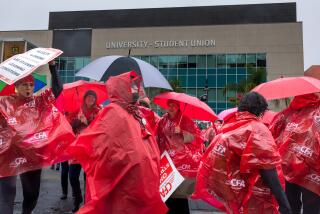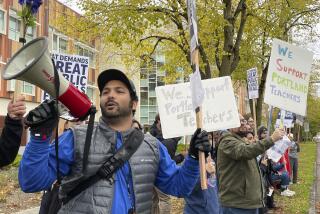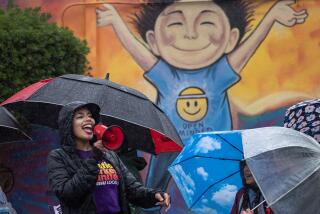Russian Teachers Strike for Raises : Education: Walkout exemplifies public workers’ resistance to government austerity. Kremlin coughs up $57 million.
- Share via
MOSCOW — Tens of thousands of teachers protesting low salaries, late paychecks and impoverished classrooms staged Russia’s first nationwide school strike Tuesday, prompting the government to cough up $57 million for promised pay raises.
The one-day walkout was part of a rising resistance by public employees to austerity measures that are finally taming inflation and stabilizing the ruble after nearly four years of erratic free-market policies.
Teachers are among the most conservative of unionized professionals in Russia, and many agonized over whether to abandon their pupils and join the strike. Fewer than one-fifth of them did so, but some schools were shut down in most of Russia’s 89 regions--with apologies to parents and children posted at main entrances.
“The young teachers are leaving, and the school system is dying,” said Lyubov V. Trunova, marching among 4,000 teachers in the Ural Mountain city of Yekaterinburg. “Only the tremendous enthusiasm of elderly teachers keeps the classrooms open.”
When the academic year opened Sept. 1, Trunova’s school could not afford to buy ledgers on which teachers record attendance. Parents were hit up for money to make repairs. Some schools’ heat and water have been shut off for non-payment of bills.
Education Minister Yevgeny V. Tkachenko reports that schools this year are short 1 million books, 15% of the required total. Ministry officials say resignations have left a teacher deficit as high as 10%.
Most of the 1.5 million teachers who stay earn less than the officially calculated poverty-line wage of $75 a month, and some are owed as much as four months’ back salary.
“It’s depressing,” said Yelena Smirnova, 23, who lives with her mother and earns $28 a month teaching music in St. Petersburg. “How can I keep doing this? Only if I marry rich.”
President Boris N. Yeltsin in August called for a 54% increase for teachers as of Sept. 1, but local governments pleaded poverty and balked at paying it.
Tuesday’s strike achieved its aim of coaxing out some money. The $57 million promised Tuesday by Yeltsin’s administration will go to local governments to pay teachers. In some places, such as Kaliningrad, the strike prompted local legislatures to increase their own school budgets.
“Unfortunately, all this is still on paper,” said Galina I. Merkulova, vice president of the nationwide teachers union. “We will take a break for a month to see what really changes. We know our problems won’t be resolved overnight, but at least we have shown that we are capable of action.”
Coal miners and air traffic controllers are in a similar mood, threatening nationwide walkouts this fall unless the government pays overdue wages and stops trying to eliminate jobs.
Economists say the wage arrears are a consequence of the government’s attempt to absorb the high cost of fighting secessionists in Chechnya without abandoning its anti-inflation goals.
The resulting cash shortage is also wreaking havoc on the banking system, which plunged into an insolvency crisis a month ago. Entire cities, such as Komsomolsk-on-Amur in Russia’s Far East, cannot pay their gas bills and face a winter without heat.
Russia’s army can no longer buy minimum bread rations for its troops. After power was cut to a nuclear submarine base last week, Russia’s Northern Fleet sent armed sailors to force the electric company to turn it back on.
Amid similar hardships two years ago, the government suffered a stinging setback in elections that gave Communists, ultranationalists and other opponents of free-market reform a large share of seats in Parliament. With a new Parliament to be elected in December, reformers still managing the economy are again resisting pressures to dole out wage subsidies and risk renewed inflation. As a result, labor rallies lately have taken on a political tinge.
Tuesday in St. Petersburg, where 5,000 teachers rallied in Palace Square, “there was not a single Russian flag, only red [Communist] flags with hammers and sickles,” Russian television reported.
The newscaster asked: “Whom will Russia’s educators, who eke out a miserable existence today, follow tomorrow?”
More to Read
Sign up for Essential California
The most important California stories and recommendations in your inbox every morning.
You may occasionally receive promotional content from the Los Angeles Times.













